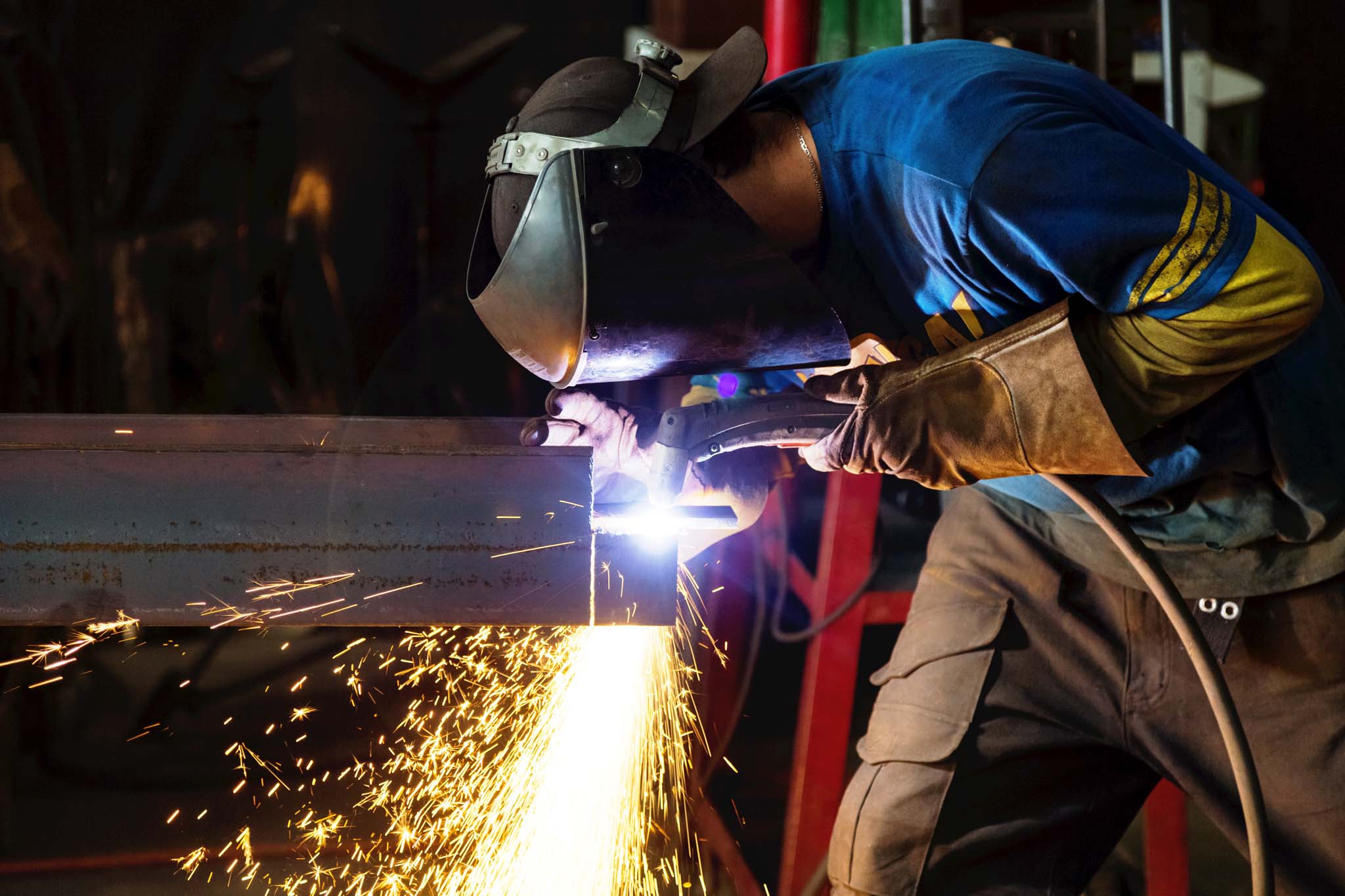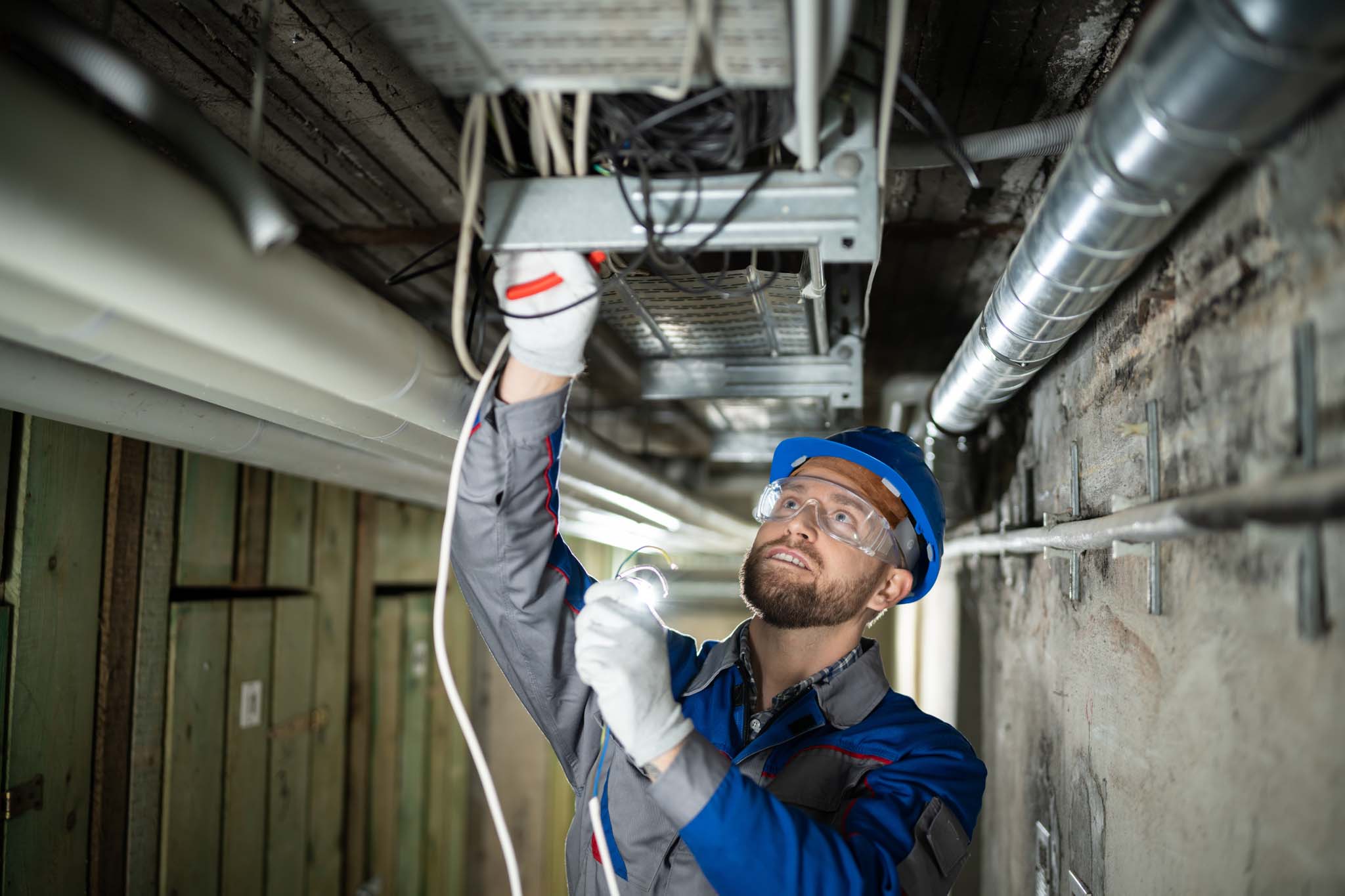Industrial
The pandemic has shown us the importance of strong domestic manufacturing. There are plenty of opportunities in this field.
Bearings Mechanic
Making sure machines don’t break down from friction is crucial for automobiles, airplanes, ceiling fans, computers, construction equipment, machinery, and refrigerators to run. As a Bearings Mechanic, you will work on anything that twists, turns, or moves.
Specifically, you will disassemble and clean bearings, seals and chocks, to check for wear and damage. Your work will literally make things move.
Blacksmith
Being a Blacksmith is the perfect cross between rugged, handy, and creative. Blacksmiths use tools to hammer, bend, and cut metal to make all kinds of objects. These include gates, grilles, railings, light fixtures, furniture, sculptures, tools, agricultural implements, farm machines, decorative and religious items, cooking utensils, horseshoes, and weapons. A master of shaping metal, you will use welds, drills, chisels, and other tools.
Cabinetmaker
Storage pros, master organizers, or anyone who appreciates interior design will appreciate a quality cabinet. As a Cabinetmaker, you will build, repair, finish, and install residential and commercial cabinets, helping people stay neat and tidy, regardless of the setting. This job will hand you a variety of woods, laminates, and other products. You will also use power and computerized woodworking equipment.
Computer Numerical Control (CNC) Programmer
Computer Numerical Control (CNC) isn’t understood by many people, so let’s start with defining it. CNC is when digitized data, a computer and CAM program is used to control, automate, and monitor the movements of a machine. The machine can be a milling machine, lathe, router, welder, grinder, laser or waterjet cutter, sheet metal stamping machine, robot, or many other types of machines.
A CNC Programmer does all this by defining areas of workpiece to be machined, determining CNC programming operations, planning the metal removal process, implementing processes, and optimizing programs. This job is at the forefront of industrial automation.
Die Designer
If you like both metal shapes and computer design, then keep reading. As a Die Designer, you will prepare and design blueprints, computer-aided drawings, and design schematics for metal form and precision tools. You will monitor and ensure that these dies are cut and shaped to specifications.
When you do a good job of shaping or cutting metal and plastic into pre-determined shapes and sizes, this will save manufacturers time and money, as it will ensure that machine parts are functioning properly.
Draftsperson – Mechanical
If you want to work in both manufacturing settings and engineering workshops, being a Draftsperson – Mechanical is right for you. This job will have you prepare drawings, designs, and plans that enable the manufacture and construction of all kinds of mechanical parts and equipment. You’ll get to use computer-aided design software as well as consult with engineers about the best way to develop and plan a design. Your drawings will be used by machinists as a reference when building a tool or piece of equipment.
Draftsperson – Plastic Mould Design
Every workplace needs a planner, and if you’re one to expect the unexpected and account for it, then consider a career as a Draftsperson – Plastic Mould Design. You are, in a sense, moulding a manufacturing setting, as you will prepare engineering designs, drawings, and related technical information. You can work independently, in multidisciplinary engineering teams, or in support of engineers, architects, or industrial designers.
On the job, you will operate computer-aided design and graphics drafting stations, develop sketches, design simple or complex templates and patterns, design mechanical equipment for mould manufacturing, and design plastic moulds for tooling.
Draftsperson – Tool and Die Design
This job is perfect for conceptual thinkers, as a Draftsperson – Tool and Die Design draw plans for templates, patterns, and components for tooling, dies, and other equipment. You will develop and prepare engineering drawings from preliminary concepts, sketches, calculations, specification sheets, and other data. You can work independently, in multidisciplinary engineering teams, or in support of engineers, architects, or industrial designers.
On the job, you will use computer-aided design and graphics drafting stations to complete their plans. You will also design mechanical equipment for tool and die manufacturing and design component parts and attachments.
Electric Motor System Technician
Does working on motors get your motor running? As an Electric Motor System Technician, you will repair and rebuild electrical machines, systems, and equipment. You will maintain, test, and repair electric motors, transformers, switchgears and other electrical apparatus. You will determine the need, extent, and type of repairs required, and prepare time and cost estimates.
Electrician (Signal Maintenance)
This job will connect devices, people, and even cities. As an Electrician (Signal Maintenance), you will maintain, modify, install, troubleshoot, and repair city-wide serial, Ethernet, and wireless communication networks. These systems are responsible for traffic control and transit systems. You will work on modems and overhead and underground cables. You will install intersection hardware up to 20 feet in the air and operate various sized trucks, trailers, boom lifting equipment, forklifts, concrete saws, and power tools.
Elevating Devices Mechanic
When an elevator in a high-rise stops working or a chair lift fails in a hospital, it is critical that both are repaired quickly and efficiently. As an Elevating Devices Mechanic, you will construct, install, and maintain devices like elevators, lifts, and escalators. Not only are you taking people to new heights, but this job will also elevate your job prospects.
Entertainment Industry Power Technician
You don’t need to be an actor or a filmmaker or on the crew to work in the entertainment industry. As an Entertainment Industry Power Technician, you will plan, install, and maintain temporary systems on set for film, television, live performances, tradeshows, and special events. You will design, install, and control temporary power distribution systems and lighting. You will power the party so there is life of the party.
Facilities Mechanic
If you want to be on the front lines of ensuring complex equipment and machinery run efficiently and properly, then consider being a Facilities Mechanic. If equipment or machinery do break down, you will be in a time crunch to get them running again. You will have the thrill of working in tight deadlines, by inspecting fire equipment, heating and ventilation systems, electric and plumbing systems, and laundry and air conditioning systems. There will also be drawing and welding.
Facilities Technician
This job oversees large buildings or facilities, like factories or warehouses. As a Facilities Technician, you will monitor the electrical, plumbing, and HVAC systems. You will also work on groundskeeping, indoor and outdoor building repairs, emergency power and lighting systems, boilers, water treatment systems, and more. If you have the strength and stamina to handle this job, it will reward you with different challenges and solutions every day.
General Machinist
If you want to know the ins-and-outs of machines, how they work, and what makes them work, then consider a job as a General Machinist. You are a critical part of manufacturing, as you will cut, shape, and finish metal to make precision machine parts. This includes using saws, drills, grinders, lathes, and mills. But this job is also intellectual: you will read and interpret complex engineering drawings to make the parts that keep these machines running.
Hydraulic/Pneumatic Mechanic
Most factories in Canada use hydraulic or pneumatic power systems. These are two types of systems that use pressurized fluids to carry power: Hydraulic systems use “wet” fluids like oil and water while pneumatic systems use “dry” fluids like pressurized air or other gases. As a Hydraulic/Pneumatic Mechanic, you will install, maintain, repair, rebuild, and modify both systems.
But this job isn’t limited to factories. These fluid power systems are also found in automobile power brakes and power steering, sliding supermarket doors, or the flaps in airplane wings. These machines are everywhere and powering society, and you will be the person making sure they all function.
Industrial Electrician
You want a wide range of repairs and fixes? Like heavy machinery or electrical equipment or control panels? As an Industrial Electrician, you will install electrical and electronic components, diagnose faults, and test them to make sure they function. You will work on motors, generators, distribution equipment systems, wiring and lighting, communications, renewable energy, and energy storage systems. You are behind what makes society move.
Industrial Mechanic Millwright
There is no shortage of industrial equipment that needs to be installed or repaired. As an Industrial Mechanic Millwright, you will work on mechanical, pneumatic, hydraulic, fuel, cooling, and exhaust systems. This includes installing, maintaining, and servicing robotics, pumps, presses, compressors, turbines, fans, generators, and compressed air, water, and exhaust ducting.
On the job, you will use machine tools, welders, power threaders, precision tools, lasers, dial indicators, and micrometers. You will also use testing equipment like vibration analysis for predictive and preventive maintenance.
Instrumentation and Control Technician
This job will place you in a vital role across many industries, ensuring equipment and systems function correctly, safely, and at peak performance. As an Instrumentation and Control Technician, you will monitor flow, temperature, and other variables for networking systems, process control, and environmental equipment.
On the job, you will calibrate, configure, install, and troubleshoot all pneumatic, electronic, electrical, mechanical, and instrumentation devices. You will also calibrate and repair analytical instrumentation that monitors or controls flow, level, temperature, pressure, acidity, conductivity and humidity.
Light Rail Overhead Contact Systems Linesperson
Light rails are becoming an important part of mass transit, and this job will ensure they are working correctly. As a Light Rail Overhead Contact Systems Linepersons, you are responsible for building and maintaining lighting systems, electrical track switch systems, contact conduct systems, and aerial feeder systems. On the job, you will create and maintain conductors, switches, transducers, air compressors, track gauges, hydraulic presses, voltmetres, ammetres, puller-tensioner machines, and hoisting equipment.
Locksmith
A Locksmith’s job is more than fixing, changing, or repairing locks. You will also fit digital locks, cut keys, open jammed locks, replace lost keys and legally open locked cars and safes. A locksmith is also skilled in customer relationships and offering professional advice on security options to safeguard homes, cars and offices. If you are a 24-hour emergency locksmith, you will offer on-call services when people are locked out of their cars, offices, and homes at odd hours.
Machine Tool Builder and Integrator
This job is at the forefront of manufacturing automation. As a Machine-Tool Builder and Integrator, you will assemble and integrate components and systems on stand-alone and machine tools on multi-station automated machines. These automated machine-tool systems are in every sector of manufacturing, including assembly, processing, and fabricating systems.
On the job, you will read and interpret complex engineering drawing and schematics and design assembly plans for machine tool building. You will use conventional and numerically controlled metal cutting machines and equipment, including saws, drills, grinders, lathes and mills.
Metal Fabricator (Fitter)
Want to work in all kinds of settings? How about making and repairing metal parts used in the construction of bridges, buildings, tanks, towers, boilers, and pressure vessels? As a Metal Fabricator (Fitter), you will build, assemble, and repair products made of ferrous and non-ferrous metals used in a wide variety of manufacturing and construction.
On the job, you will develop patterns and lay out, cut, and fabricate structural steel, plate, and metals. You will also assemble and fit metal sections and plates together to form complete machine units or sub-units.
Mould Maker
This is a job perfect for those who want to work with both metal and plastic. As a mould maker, you will design, make, and repair moulds to mass-produce plastic or metal components and products. You will use hand-moulding techniques, but more often, you will use computer and industrial technology to produce large numbers of identical items.
On the job, you will interpret complex engineering drawings and work-process documents, and then use build mould components with conventional and numerically controlled metal-cutting machines and equipment including saws, drills, grinders, lathes, mills, and EDMs.
Mould or Die Finisher
This is a job of detail and precision. As a Mould or Die Finisher, you will use a variety of hand and power tools to shape, smooth, finish, and polish moulds or metal working dies.
Optics Technician (Lens and Prism Maker)
There’s more to glass than what meets the eye. As an Optics Technician, you will produce spherical and plane optics to specifications, correct lens and prism surfaces, and fabricate optics. In plain English, you will work on lenses for cameras, projectors, eyewear, microscopes, telescopes, domestic appliances, and binoculars. This job requires knowledge about the propagation of light, reflection and refraction of light, composition of white light, and converging/convex or diverging/concave lenses.
On the job, you will set up and operate optic machinery including spherical grinders, drills, fine grinders, polishers, and centre and edge grinders. You’ll also get to coat lenses and prisms with anti-reflecting or high-reflecting coats.
Packaging Machine Mechanic
This job may not deliver packages, but it is responsible for moving them. As a Packaging Machine Mechanic, you will set up packaging lines to accommodate various products, package dimensions, and production volumes. You will also repair, adjust, or maintain this equipment.
More specifically, you will adjust guides, belts, conveyor speeds, and drive and transfer mechanisms. You will clean and lubricate machine components to make sure they operate smoothly and will refer complex electrical and mechanical repairs to certified personnel.
Pattern Maker
This job is where creativity meets precision. As a Pattern Maker, you will build wood, plastic, metal or polystyrene models to produce castings for mould makers. You will design and create foundry patterns and core boxes from metal, wood, plastic, and polystyrene for parts and components cast from metal. This will involve using wood and metal cutting machines and equipment, including saws, drills, grinders, lathes, mills and electrical discharge machines..
Pressure Systems Welder
This is a job that goes deep into factories and industrial settings. As a Pressure Systems Welder, you will use all kinds of welding—like shielded metal arc, gas metal arc, gas tungsten arc, flux cored arc—to weld metal plates, shells, tubes, drums, and other structures in boilers and pressure systems to assemble and repair them. You will also cut pipes and tanks and assemble these pieces, and repair defective welds in boilers and pressure systems.
Process Operator – Food Manufacturing
As a Process Operator – Food Manufacturing, you will work for food manufacturers and oversee the equipment that processes ingredients into the final products. Depending on your part in the production process, you will prepare machinery for use, weigh ingredients, and mix them. Maybe you’ll get to work on producing some of Canada’s favourite snacks!
Process Operator – Power
Does working in a power plant excite you? As a Process Operator – Power, you will monitor and run processing equipment, using hand tools and measuring devices to maintain temperature and pressure levels in the power plant. On the site, you will operate satellite control rooms, adjust valves and pumps, complete maintenance, prepare production equipment, and run safety audits and programs.
Process Operator – Refinery, Chemical and Liquid Processes
This is a job that’s perfect for those who love productivity and efficiency. As a Process Operator – Refinery, Chemical and Liquid Processes, you will monitor valves, pumps, and other equipment to make sure factories are running effectively. On the site, you will operate satellite control rooms, adjust valves and pumps, complete maintenance, prepare production equipment, and running safety audits and programs.
Process Operator – Wood Products
You can turn the page to the next chapter of your career working in pulp and paper plants. As a Process Operator – Wood Products, you will monitor and maintain the equipment in wood products and in paper plants. On the site, you will maintain tools and equipment, operate a central control room, control chemical composition, and carry out quality control.
Railway Car Technician
Here’s a job for people who are skilled in mechanics and enjoy hands-on work. As a Railway Car Technician, you will be responsible for inspecting trains and repairing cars on the tracks or in repair shops. On the job, you will inspect, repair, replace, and recondition mechanical or structural components and systems of freight cars and passenger coaches. You will also service rail trucks, underframes, brakes, car safety appliances, car bodies, and coaches. From the driver to the caboose, you are making trains run.
Relay and Instrumentation Technician
If you’re passionate about making sure transit is coordinated and moves properly, you can do so as a Relay & Instrumentation Technician. You’ll be repairing, overhauling, and calibrating vital signal control relays within transit systems. More specifically, you’ll diagnose and repair data acquisition and code systems, devices, computers, and power systems.
Saw Filer/Fitter
This job will have you living life on the edge… of a blade. Saw blades, to be exact, and as a Saw Flier/Fitter, you will repair, set, and sharpen blades for band, chain, hand, circular, and other types of saws in lumber or paper mills. Specifically, you will file grooved, contoured and irregular surfaces of knives, saw blades and metal objects. Sharp surfaces will require a sharp mind and sharper hands.
Surface Blaster
Imagine getting paid to blow things up. As a Surface Blaster, you will fill blast holes with explosives and detonate them to dislodge coal, ore, and rock to demolish structures. But you don’t just start blasting. On the job, you will assess the pre-blast area and site, control the blast area, design and implement the blast, load blast holes, hook up and initiate shot, and assess the results.
Surface Mount Assembler
The people who get into the nitty-gritty of electronics are why mobile phones, TVs, refrigerators, and other appliances even work. As a Surface Mount Assembler, you will solder, bond and assemble the various components that make electronics function. Your job is to put together electronic components like transistors, diodes, capacitors, integrated circuits, wires, and other parts.
Thin Film Technician
This job is a combination of mechanical, math, and writing skills. As a Thin Film Technician, you will apply very thin optical coatings for wavelength filters, anti-reflection coatings, special mirrors, and polarizing elements. On the job, you will work with spherical precision optics, syncro-speed precision optics, and plano precision optics.
Tool and Cutter Grinder
As a Tool and Cutter Grinder, you will set up and operate grinder machines to shape or sharpen precision cutting tools and cutters. Machines include surface, cylindrical, pedestal, and tool or cutter grinders.
Tool and Die Maker
This is a job that will put you in machine shops, tool rooms, and on factory floors. As a Tool and Die Maker, you will set up and operate a variety of computer-controlled or mechanically-controlled machine tools to produce precision metal parts, instruments, and tools. These tools include dies, cutting tools, jigs, fixtures, gauges and specialty tools using various metals, alloys and plastics.
On the job, you will build precision dies, tools and prototypes using conventional and numerically controlled metal-cutting and forming machines and equipment, including saws, drills, grinders, lathes, mills, die presses and electrical discharge machines.
Tool and Gauge Inspector
To become a Tool and Gauge Inspector, you are likely already working as a Tool and Die Maker. But as a Tool and Gauge Inspector, you will inspect, test, and adjust new and reworked tools, dies, jigs, fixtures, and gauges.
Tool/Tooling Maker
This is a job for people who love to fix and build machines. As a Tool/Tooling Maker, you will repair specialized equipment, cutting tools, gauges, jigs, fixtures, prototypes, and mechanical devices used for testing parts. You will also produce components to build machines and tooling used to create various industrial and consumer products.
On the job, you will use conventional and numerically controlled metal cutting machines and specialized equipment. You will also assemble and fit tools and tooling components, and design, build and assemble tools, jigs, fixtures, specialized equipment, instruments, models and prototypes. When all that is done, you will conduct final fitting and inspection of tool sub-assemblies and components as well as complex tools and tooling.
Tractor-Trailer Commercial Driver
This is a job perfect for those who like to travel, or at least enjoy long drives on the highway. As a Tractor-Trailer Commercial Driver, you will drive a commercial tractor-trailer and manage the safe transportation of goods and materials on roads and highways. You will travel all over Canada, the United States, and elsewhere.
Specifically, you will plan and execute driving routes, secure cargo and loads to ensure safety and prevent damage, and handle equipment off-road and on highways. You will also inspect equipment, conduct routine vehicle safety checks, and report problems.
Water Well Driller
This is a job for people on an endless search for water sources. As a Water Well Driller, you will operate various types of drilling equipment for the purpose of drilling and servicing water wells. You will perform service and maintenance of drilling equipment, select and change drilling tools, complete bore holes into a productive well, and disinfect and service completed wells and pumping equipment. On the job, you will use material handling and welding equipment to weld studs and braze.
Welder
Sparks will fly, you’ll have an epic face shield, and you’ll work with a lot of heat. If this is your style of work, then as a welder, you will permanently fuse pieces of metal or manufactured parts using metal filler and heat and/or pressure. You will also build structures and repair broken or cracked parts according to specifications. You’ll deal with three major types of welding: arc, gas, and resistance.
Thinking about your career? The skilled trades could be perfect for you.

Reasons to consider the skilled trades
The skilled trades provide rewarding, lucrative and purpose-driven career pathways that are in high demand.

Can I pursue a skilled trade?
Find out if you’re eligible to pursue a skilled trade in Ontario. Spoiler: there’s a skilled trade for everyone.

Frequently asked questions
Providing answers to your biggest questions about the skilled trades. Covers everything from the pay to training.



